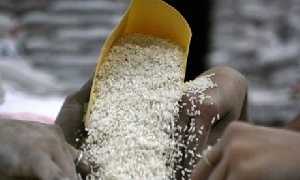Accra, Aug. 16, GNA – The rice industry in Ghana has seen unprecedented increase in consumption levels over the past decade with significant proportion of consumers switching from consumption of other staples to rice.
Additionally, rice has become an important staple for both rural and urban dwellers and is gradually taking over from traditional crops such as root and cereal crops.
Dr Mamaa Entsua Mensah, Deputy Director General of the Council for Scientific and Industrial Research (CSIR), announced this at an inception workshop by the Canadian International Development Agency (CIDA)-founded Africa Rice Project, in Accra on Tuesday.
The workshop, which was attended by food scientists, representatives of rice producers and marketers and non-governmental organisations in the rice sector and donor agencies, was aimed at enhancing food security in Africa through the improvement of rice post-harvest handling, marketing and the development of new rice-based products.
Dr Mensah said about 70 per cent of rice consumed in Ghana was imported and these importations had been consistently high since 2001.
For instance, Ghana imported $157 million, $187 million and $218 million worthy of rice in 2007, 2008, and 2009 respectively.
She said despite the efforts made in local rice production the cost of production was high and uncompetitive in the domestic market due to relatively cheaper imported rice.
Dr Mensah said there was significant quality gap between locally produced and imported rice due to cost of inputs, poor post-harvest handling, lack of access to improved processing technologies and marketing challenges.
She noted that high local demand for foreign rice was crowding-out local farmers and processors from their own domestic market resulting in jobs loss, poor quality livelihood and increased food insecurity among rice farmers and other value-chain actors.
She stressed the need for urgent intervention in the rice industry to ensure proper post harvest handling and marketing.
Dr Paa Nii Torgbor Johnson, Director of the Food Research Institute (FRI), said increasing the national rice production with value added processing would contribute significantly to reduce the rising costs of rice imports.
He said the measure would also provide income sources to the rice farmers and all those involved in the rice value chain.
The CIDA Africa Rice Project, which aims at supporting research into rice production and post harvest handling, focuses primarily on the promotion of food security and poverty reduction.
“In pursuing those longer-term outcomes, we are always conscious of the link between research and poverty reduction” Dr Johnson added.
Paa Kwesi Forson, a representative of the Ghana Rice Inter-Professional Body (GRIB), tasked government to concentrate efforts on important areas within the value chain and to channel resources to address the challenges and to improve value chain efficiency.
He said creating sustainable market channels through stakeholder’s dialogue and the development of national rice standards was key to addressing the marketing challenges faced by local rice farmers.
He called for constant dialogue among members of the value chain to generate business opportunities and create avenue for business to business interactions.
General News of Tuesday, 16 August 2011
Source: GNA
Rice consumption reaches record levels in Ghana – Dr Mensah
Opinions












